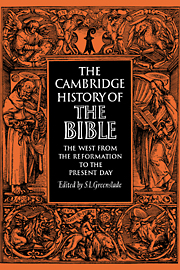Book contents
- Frontmatter
- Chapter I The Bible in the Reformation
- Chapter II Biblical Scholarship: Editions and Commentaries
- Chapter III Continental Versions to c. 1600
- Chapter IV English Versions of the Bible, 1525–1611
- Chapter V The Religion of Protestants
- Chapter VI The Bible in the Roman Catholic Church from Trent to the Present Day
- Chapter VII The Criticism and Theological Use of the Bible, 1700–1950
- Chapter VIII The Rise of Modern Biblical Scholarship and Recent Discussion of the Authority of the Bible
- Chapter IX Continental Versions from c. 1600 to the Present Day
- Chapter X English Versions since 1611
- Chapter XI The Bible and the Missionary
- Chapter XII The Printed Bible
- Chapter XIII Epilogue
- Appendices
- Bibliography
- Notes on the Plates
- Index
- Plate Section
- References
Chapter XI - The Bible and the Missionary
Published online by Cambridge University Press: 28 March 2008
- Frontmatter
- Chapter I The Bible in the Reformation
- Chapter II Biblical Scholarship: Editions and Commentaries
- Chapter III Continental Versions to c. 1600
- Chapter IV English Versions of the Bible, 1525–1611
- Chapter V The Religion of Protestants
- Chapter VI The Bible in the Roman Catholic Church from Trent to the Present Day
- Chapter VII The Criticism and Theological Use of the Bible, 1700–1950
- Chapter VIII The Rise of Modern Biblical Scholarship and Recent Discussion of the Authority of the Bible
- Chapter IX Continental Versions from c. 1600 to the Present Day
- Chapter X English Versions since 1611
- Chapter XI The Bible and the Missionary
- Chapter XII The Printed Bible
- Chapter XIII Epilogue
- Appendices
- Bibliography
- Notes on the Plates
- Index
- Plate Section
- References
Summary
For nearly two thousand years the missionary work of the Church has been essentially Bible-centred, and that in three senses: the Bible has been the source of inspiration and of spiritual nourishment for the missionary himself; it has also been the basis of the worship of the Church into which he sought to bring pagan or non-Christian tribes or individuals; and (to a larger extent than is commonly recognized) it has been a means of evangelism in itself.
From the end of the period of oral transmission the Church was dependent for authentic knowledge of Christ on the apostolic witness enshrined in the Epistles and Gospels. The final definition of the canon, followed by the provision of an authoritative version of the Latin Scriptures by St Jerome, was, therefore, an important step both for the inner life of the Christian community and for its expansion into the pagan world. The facts to which successive generations of Christian missionaries have borne witness are not merely matters of subjective experience: they are rooted in history, and in a history which is recorded uniquely in the documents which comprise the New Testament, read in the context of the Old Testament. Moreover, it has been the consistent witness of the Church in every age that these records contain not only an account of the coming of Jesus Christ and of his work for man's salvation, but also an authentic Word of God to the human soul. The missionary, therefore, has been bound to the Bible by a threefold cord: his own spiritual life and his authority as a messenger of the Gospel depended on his own knowledge of the Scriptures; the message he sought to proclaim and the Church into which he brought his converts was centred on the Bible; and the written Scriptures were a means by which the Gospel could lay hold of the minds and hearts of men and women, sometimes more effectively than by any word of his own.
- Type
- Chapter
- Information
- The Cambridge History of the Bible , pp. 383 - 407Publisher: Cambridge University PressPrint publication year: 1963



